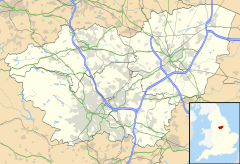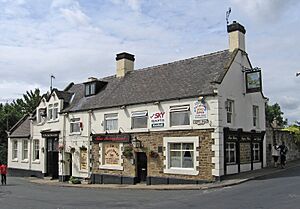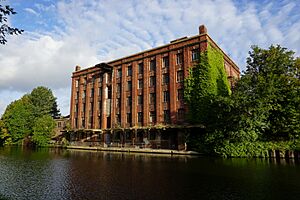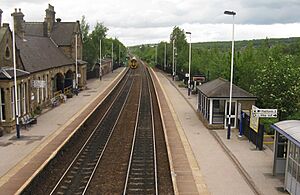Mexborough facts for kids
Quick facts for kids Mexborough |
|
|---|---|
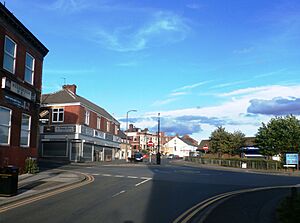 The town centre |
|
| Population | 15,244 (Ward. 2011 census) |
| OS grid reference | SE4700 |
| Metropolitan borough |
|
| Metropolitan county | |
| Region | |
| Country | England |
| Sovereign state | United Kingdom |
| Post town | Mexborough |
| Postcode district | S64 |
| Dialling code | 01709 |
| Police | South Yorkshire |
| Fire | South Yorkshire |
| Ambulance | Yorkshire |
| EU Parliament | Yorkshire and the Humber |
| UK Parliament |
|
Mexborough is a town in South Yorkshire, England. It's located in the City of Doncaster District, near the River Don. The town is close to where the River Don meets the River Dearne. Mexborough is next to Swinton and Conisbrough.
Historically, Mexborough was part of the West Riding of Yorkshire. In 2011, about 15,244 people lived there.
Contents
What's in a Name? The Origin of Mexborough
The name Mexborough comes from old languages. It's a mix of an Old English or Old Norse personal name, like Meke or Mjukr. The second part, burh, means a strong, fortified place in Anglo-Saxon Old English. So, it means something like "Meke's fortified place."
A Look Back: The History of Mexborough
Mexborough has a long and interesting history. It sits at one end of a large earth wall called the Roman Ridge. People think this wall was built by the Brigantian tribes in the 1st century AD. It might have been a defense against the Roman invasion of Britain. Another idea is that it was built later, after the 5th century, to protect the British kingdom of Elmet from the Angles.
Early Records and Norman Times
The first time Mexborough was written about was in the Domesday Book of 1086. This book said that before the Norman Conquest of England, two Saxon lords, Wulfheah and Ulfkil, controlled the area. After the Normans took over, a Norman Baron named Roger de Busli gained control. In Castle Park, you can still see the remains of an earthwork. People believe this was a motte-and-bailey castle built in the 11th century, soon after the Norman Conquest.
St John the Baptist's Church has parts that are from the 12th century. A few other buildings from before the 1800s are still standing. These include old public houses like the Ferryboat Inn and the Red Lion. Most of the buildings in Mexborough today were built after 1800.
Industrial Growth and Community Life
For many years, from the 1700s to the mid-1900s, Mexborough's main industries were coal mining, quarrying, making bricks, and producing ceramics. The town also became a busy place for trains. These industries brought many jobs but also led to health problems for workers.
Because of this, a new hospital was needed. Lord Montagu gave land for it, and the first stone was laid in 1904. This hospital, called Montagu Hospital, is still a working hospital today.
The growth of industries also brought more people and new opportunities to Mexborough. Many new businesses and public houses opened. A famous comedian, Stan Laurel, even stayed at the Montagu Arms pub in 1907 after performing in town!
In the late 1800s, a Cooperative Society was started in Mexborough, just like in many other industrial towns. It was based on the idea of people working together to buy things they needed. The Mexborough Working Men's Industrial Society began in 1861 with nine men. It grew quickly, and by the 1890s, it had 1,200 members and ten shops. Later, it was taken over by the Barnsley British Co-operative Society. One of Mexborough's well-known buildings is the former Barnsley British Cooperative Society flour mill. It stands near the River Don Navigation.
The Railway and Its Impact
For over a hundred years, the railway locomotive maintenance and stabling depot, known as "Mexborough Loco", was a huge employer. The railway arrived in Mexborough in 1850. Because of all the coal being mined, many trains were needed to carry it. These trains needed places to be stored, refueled, and repaired. Mexborough was chosen for a large depot. At its busiest, it had about 150 locomotives. The depot closed in 1964.
After coal mining ended in the 1980s, Mexborough, like many other mining towns, has been working to rebuild its economic and social life.
Mexborough's Pottery
The Rock Pottery was an important ceramics business in Mexborough. In 1839, James Reed bought it, and his son John later renamed it the "Mexborough Pottery." John Reed expanded the business and even bought molds from another famous pottery, the Rockingham Pottery, when it closed. He continued making similar items with new designs.
Getting Around: Transport in Mexborough
Mexborough has good transport links for both trains and buses.
Train Travel
Mexborough railway station is located on the south side of the River Don. Local trains run from here towards Doncaster and Sheffield. These services are operated by Northern Trains, usually running once an hour in each direction.
Bus Services
Mexborough also has a bus station called Mexborough Interchange. It's in the town centre, close to the main streets. The bus station has several stands for buses. Most bus routes go through the town centre in a loop. Buses heading east towards Doncaster stop on Greens Way, while buses heading west towards Barnsley and Rotherham stop on Hartley Street.
The Interchange was built in the early 1990s. It replaced older bus stops on the High Street, which is now a pedestrian-only area.
| Stand | Route | Destination |
|---|---|---|
| A1 | X20 | Doncaster |
| A2 | 221 | Doncaster |
| A3 | 208 | Grimethorpe |
| 218, 218a | Barnsley |
|
| B1 | – | no services allocated |
| HS1 | – | no services allocated |
| HS2 | 208 | Rotherham |
| 221 | Rotherham |
|
| HS3 | 218, 218a | Rotherham |
| X20 | Barnsley |
Learning in Mexborough: Schools
Mexborough has one secondary school, Laurel Academy. There are also many primary schools for younger students.
Staying Connected: Media in Mexborough
Local news and TV shows for Mexborough come from BBC Yorkshire and ITV Yorkshire. Radio stations include BBC Radio Sheffield, Heart Yorkshire, Capital Yorkshire, and Greatest Hits Radio Yorkshire. There are also local newspapers like the Dearne Valley Weekender and Doncaster Free Press.
Sports in Mexborough
Mexborough has had several football teams play in the FA Cup. The most well-known was Mexborough Town, which won the Yorkshire Football League in 1973.
Famous Faces: Notable People from Mexborough
Many talented people have come from Mexborough, including:
- Keith Barron – an actor
- Brian Blessed – a well-known actor
- Eric Brook – a footballer
- Sally Carman – an actress
- Dan Clarke – a motor racing driver
- William Hackett – a brave soldier who won the Victoria Cross in 1916
- William 'Iron' Hague – a British heavyweight boxing champion
- Ted Hughes – a famous poet who was the Poet Laureate from 1984–98
- Mike Hawthorn – a motor-racing driver who became the Formula 1 World Champion in 1958
- Dennis Priestley – a professional darts player and two-time world darts champion
- Donald Watson – the person who started The Vegan Society
See also
 In Spanish: Mexborough para niños
In Spanish: Mexborough para niños
 | William Lucy |
 | Charles Hayes |
 | Cleveland Robinson |


